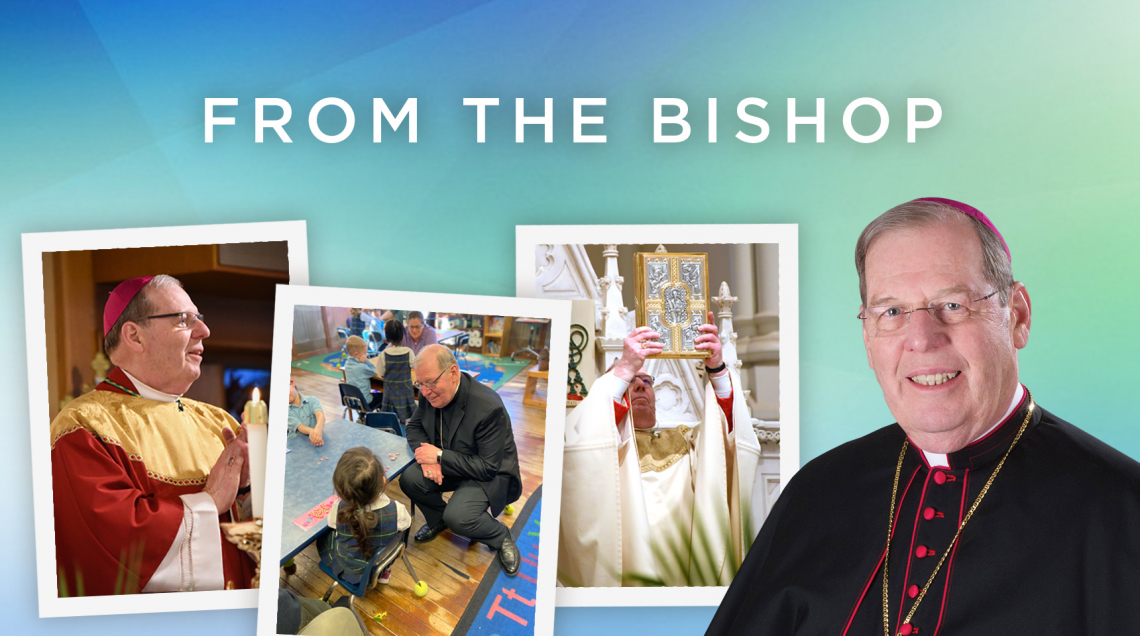From the Bishop - July 2020

We thought our crisis for this year was the pandemic resulting from the novel coronavirus, the cause of much illness and death. It has brought about great dislocation as we try to be safe and keep each other from harm. Social distancing, we have been told, is the way to slow the spread of this disease. We have done it. We continue to work from home. This crisis seemed enough for us for this year.
Now, however, we are confronted with a new reason for distress. The ugly face of racism has become evident once again in our midst. On Memorial Day weekend, George Floyd, a black man, died after being restrained by a white police officer in Minneapolis, MN. Our streets, which had been quiet due to social distancing, have become filled with mass demonstrations. These protests have reminded us that race is still a challenge in our country. The racial divide that underlies this man’s death is part of our national story and will only be rooted out when there is an acknowledgement of the harm of racism and a determination to see each other, black, white, or brown in skin color, as God sees us, as human beings worthy of respect and created in his love.
During the height of these protest demonstrations, I was out for a walk and came upon some children playing. They were black. On a nice late spring afternoon, they were happily enjoying their games surrounded by the bikes and toys of their play. But on the sidewalk was the product of their afternoon artwork. They had drawn a colorful representation in chalk of the slogan of the demonstrations: Black Lives Matter. I thought to myself, why would these beautiful children ever think that their lives do not matter? And yet, when we talk to black people, they share with us that they do not believe our society values them. The pastoral letter of the American bishops on racism, Open Wide our Hearts: The Enduring Call to Love, puts it this way: “African Americans continue to struggle against perceptions that they do not fully bear the image of God, that they embody less intelligence, beauty, and goodness. This reality represents more than a few isolated stories; it was the lived experience of the vast majority of African Americans for most of our national history.”
The death of George Floyd is painful evidence of the cost of systemic racism. Society has failed to value and protect the life of this man. That is a source of the fear of black people in America and even the children of our own neighborhoods. As Catholics, we are called to nurture and protect life from conception to its natural end. The demonstrations and protests of these days call for justice. They express the pain of a people who live in fear. Our response must be to affirm the inestimable value of every person’s life.
But first, I believe we need to understand the problem. Most of us believe that we are free of any racist inclinations. But it would be good for us to give this some consideration. We might use some of the time we have in staying home during this pandemic to read the bishops’ pastoral letter on racism: Open Wide our Hearts: The Enduring Call to Love and follow the study guides to understand the dimensions of the problem. As Christians, we are constantly called to examine our own hearts and consciences for how we might contribute to or break down racial divisions, intolerance, and discrimination. The failure to act to end systemic racism hurts those who are victimized and denies all of us the opportunity to benefit from the gifts of diversity.
The pastoral letter gives each of us an opportunity to see the problem as it exists in the lives of those who suffer from the effects of racism. It will help us to look at our lives and examine our own attitudes. These are some questions we might pose for ourselves so that we are open to what we learn from our study of this letter:
1. Have I fully loved God and fully loved my neighbor as myself?
2. Have I caused pain to others by my actions or my words that offended my brother or my sister?
3. Have I done enough to inform myself about the evil of racism, its roots, and its historical and contemporary manifestations?
4. Have I opened my heart to see how unequal access to economic opportunity, jobs, housing, and education on the basis of skin color, race, or ethnicity, has denied and continues to deny the equal dignity of others?
5. Is there a root of racism within me that blurs my vision of who my neighbor is?
This reflection can also be a shared one where the family studies this document together. To include everyone, there is, as well, a resource available for children to study the ideas discussed in the pastoral letter. Everyone Belongs is a book about recognizing the value of our differences, respecting each other, and forgiveness.
Such a reflective and prayerful reading of the pastoral letter will hopefully join us in striving to end racism in all its forms, that we may walk together humbly with God and with all of our brothers and sisters in a renewed unity with the conviction that all men and women are created in the image and likeness of God.
Resources
Links to Opening Wide Our Hearts: The Enduring Call to Love and Everyone Belongs may be found at www.portlanddiocese.org/harvest/opening-our-hearts










